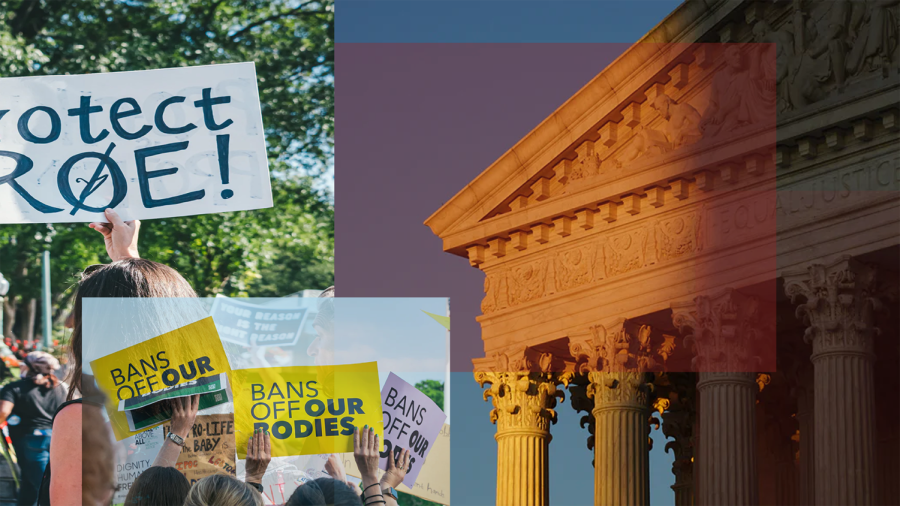Lien: Abortion Rights Are Queer Rights
(Design by Emily Christensen | The Daily Utah Chronicle)
July 8, 2022
With most of the Supreme Court consisting of conservative and male justices, condemning millions of women was their easiest decision. As the American people watched with bated breath, the Supreme Court unsurprisingly overturned the 1973 Roe v. Wade decision. The original decision upheld that women in the United States have a fundamental right to abortions without excessive government restrictions. Since the overturning on June 24, questions have risen as to whom this affects.
The overturning of Roe v. Wade spells disaster for other human rights and will result in grave consequences for the queer community.
Queer Health At Stake
Overturning Roe v. Wade affects queer people arguably more than heterosexual individuals. Lesbians and bisexual women are more likely than heterosexual women to have an abortion. Due to issues including abortion access and health care mistreatment, over a third of transgender people who have been pregnant considered terminating the pregnancy themselves. Nearly one in five of those who considered an abortion went through with the attempt.
Aside from abortion access, clinics that offer these services also provide gender-affirming healthcare for the transgender community. If these clinics can no longer operate, many trans people lose access to essential healthcare.
Jeopardizing Marriage Equality
Overturning Roe v. Wade doesn’t only mean the restriction of abortions and bodily autonomy. The Supreme Court willingly overturned a 50-year precedent, and worry brews in the queer community over fears of future attacks on civil rights. Knowing the political leanings of those in power, the apprehension makes sense.
Gabby Nieto, a political science major at the University of Utah, holds several jobs. As an intern with Sen. Derek Kitchen’s campaign, she works closely with Planned Parenthood. Nieto states that Roe v. Wade’s overturning “is a door that opens to also look at overturning other laws that protect queer people.”
Supreme Court Justice Samuel Alito stated in his opinion that overturning Roe would not threaten other precedents. However, Justice Clarence Thomas expressed his willingness to reconsider other decisions, such as Griswold, Lawrence and Obergefell. These decisions established a right to contraception for married couples, overturned criminal sodomy laws and required states to recognize same-sex marriages.
President Joe Biden even stated that “if you read the opinion … [it] basically says there’s no such thing as the right to privacy … mark my words: They are going to go after the Supreme Court decision on same-sex marriage.”
More Than Abortions
In the wake of its overturning, it’s important to recognize what else Roe v. Wade protected in tandem with abortion. Roe v. Wade holds that the Bill of Rights protects the essence of privacy, or the right “to be let alone.” Many groundbreaking laws jumped off this decision, such as the right to personal control of medical treatments, the right to maintain family relationships and the right to procreate.
As expected, obtaining contraceptives may end up a thing of the past. But for those who do want to have children, the already difficult-to-access fertility treatments will be even more inaccessible. If the law states that human life begins at conception, it would make in vitro fertilization impossible to really function. This adds on to the list of attacks against queer people, whether intentionally or not, since many LGBTQ people rely on assisted reproduction.
Even with Roe v. Wade in place, systemic racism, white supremacy and coercive reproductive policies push abortion access out of reach. For marginalized groups, such as Black, Latino, Indigenous and lower income communities, there are even greater barriers to abortion access.
Overturning Roe v. Wade holds dangerous consequences for everyone, regardless of gender identity, sexuality or political leaning. Limiting healthcare accessibility directly conflicts with the Bill of Rights’ protection of “life” and “liberty,” as outlined in the Fifth Amendment. Who knows what’s on the horizon for rights of other marginalized groups.
Many people will die because of the reversal of Roe. Abortions may be illegal, but people will still find a way to access them. I hope the Supreme Court is prepared for the blood that’s about to be on their hands.










RyanW • Jul 12, 2022 at 12:21 pm
The statistics cited in this article to prove disproportionality are quite deceptive. Notice that they are focusing on “lesbians who become pregnant” with out telling you the number of Americans this affects. Is this based on 10 people? 100 people? I can’t imagine that it is very high as it would seem most lesbians don’t engage in heterosexual intercourse. The main exception I see to this is of course rape, which nearly everywhere is a permissible exception to abortion rules (at least with in the first however many weeks of pregnancy.) I just am having a hard time seeing how abortion laws could disproportionately affect gay people.